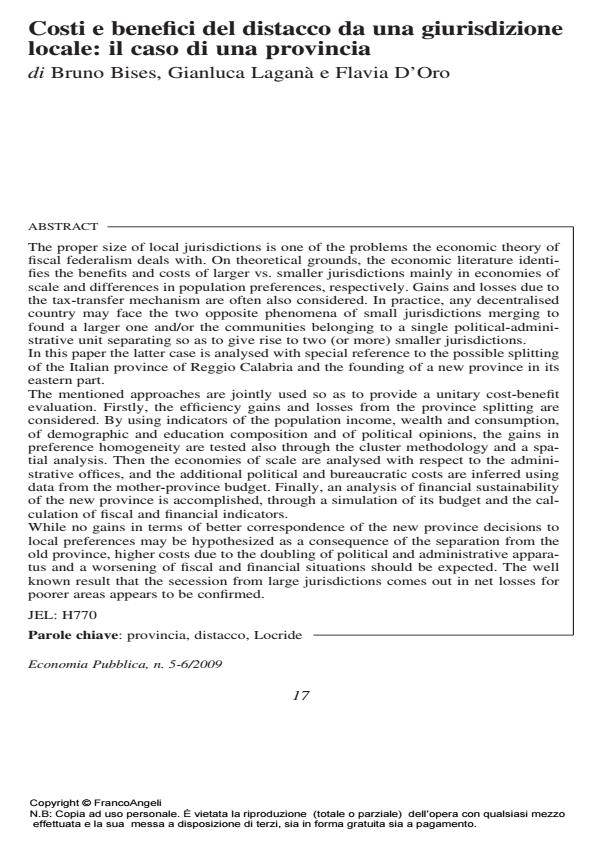Costi e benefici del distacco da una giurisdizione locale: il caso di una provincia
Journal title ECONOMIA PUBBLICA
Author/s Bruno Bises, Gianluca Laganà, Flavia D'Oro
Publishing Year 2011 Issue 2009/5-6
Language Italian Pages 28 P. 17-44 File size 2082 KB
DOI 10.3280/EP2009-005002
DOI is like a bar code for intellectual property: to have more infomation
click here
Below, you can see the article first page
If you want to buy this article in PDF format, you can do it, following the instructions to buy download credits

FrancoAngeli is member of Publishers International Linking Association, Inc (PILA), a not-for-profit association which run the CrossRef service enabling links to and from online scholarly content.
The proper size of local jurisdictions is one of the problems the economic theory of fiscal federalism deals with. On theoretical grounds, the economic literature identifies the benefits and costs of larger vs. smaller jurisdictions mainly in economies of scale and differences in population preferences, respectively. Gains and losses due to the tax-transfer mechanism are often also considered. In practice, any decentralised country may face the two opposite phenomena of small jurisdictions merging to found a larger one and/or the communities belonging to a single political-administrative unit separating so as to give rise to two (or more) smaller jurisdictions. In this paper the latter case is analysed with special reference to the possible splitting of the Italian province of Reggio Calabria and the founding of a new province in its eastern part. The mentioned approaches are jointly used so as to provide a unitary cost-benefit evaluation. Firstly, the efficiency gains and losses from the province splitting are considered. By using indicators of the population income, wealth and consumption, of demographic and education composition and of political opinions, the gains in preference homogeneity are tested also through the cluster methodology and a spatial analysis. Then the economies of scale are analysed with respect to the administrative offices, and the additional political and bureaucratic costs are inferred using data from the mother-province budget. Finally, an analysis of financial sustainability of the new province is accomplished, through a simulation of its budget and the calculation of fiscal and financial indicators. While no gains in terms of better correspondence of the new province decisions to local preferences may be hypothesized as a consequence of the separation from the old province, higher costs due to the doubling of political and administrative apparatus and a worsening of fiscal and financial situations should be expected. The well known result that the secession from large jurisdictions comes out in net losses for poorer areas appears to be confirmed.
Keywords: Provincia, distacco, Locride
Jel codes: H770
Bruno Bises, Gianluca Laganà, Flavia D'Oro, Costi e benefici del distacco da una giurisdizione locale: il caso di una provincia in "ECONOMIA PUBBLICA " 5-6/2009, pp 17-44, DOI: 10.3280/EP2009-005002